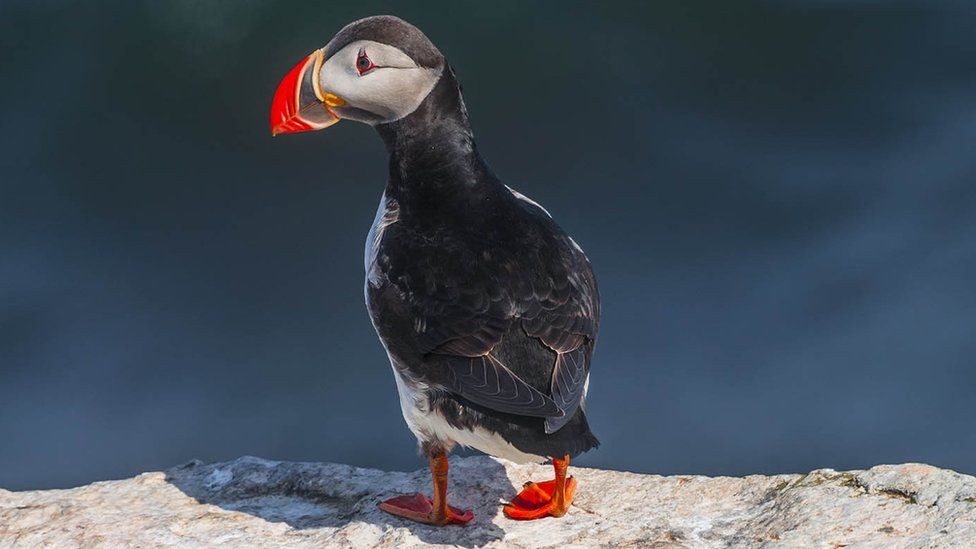The island where people eat puffins
- Published

The seabirds' cute appearance is a big lure for tourists. But for inhabitants of a remote corner of Iceland, the taste of puffin is a reminder of home, writes Ros Jones.
You need a strong stomach to take the boat to the Arctic island of Grimsey. When you board the ferry at Dalvik on Iceland's northern shore, staff make sure to point out the huge stack of sick bags, and they don't say "just in case".
Instead, rather grimly, you are told: "You really will need one. It'll happen, don't be embarrassed."
After three hours on very, very choppy waters, you long for land. The island is tiny - just 5km (3.1 miles) long and 2km wide - just two square miles. It has no trees - it's far too windy for them to grow here. There is one tiny school for the younger children - currently it has just five students.
Grimsey also boasts one shop, a few dozen houses, a swimming pool, lighthouse and 80 residents.
The sky, though, is vast - pale washes of white, blue and grey.
People visit mostly for the sea birds - hundreds and hundreds of thousands of them. Maybe millions. Fulmars, kittiwakes, razorbills, terns and guillemots, but the stars of the show are the puffins.
They poke their heads - sporting comical, outsize orange beaks - above the black cliff edges before darting off, in a sudden swarm, to dive for fish below.
I was lucky to see them. In mid-August they disappear to spend the winter at sea.
Ragnhildur, Gagga for short, who met me off the boat and showed me around, said that the migration happens almost overnight - one morning you wake up and they've gone.
Gagga has spent all her married life on Grimsey. Her husband, like nearly all the men here, is a fisherman. The industry is the reason why this Arctic outpost has survived.
Cod are plentiful and there's good money to be made. "The boats often don't need to go out very far," she said. "You can sometimes see them from the shore."
Gagga grew up on a farm on Iceland's mainland - she told me that, with a wide grin, when I asked if she had found the isolation of Grimsey life hard when she'd first arrived. No, she laughed. She had long been used to her own company: "Have you spent a winter on a farm in Iceland?"
But Grimsey, in summer at least, is no longer quite the isolated place it once was.
Gagga was certainly kept very busy. She apologised as soon as she met me. "I can show you around later," she said. "But first I have to meet some visitors at the airstrip." Small planes land here nearly every day and walking round the island, you see a steady stream of tourists exploring the cliff paths.
Cruise ships stop here now too. Sitting in one of two harbour cafes, eating waffles, I watched as a long, winding queue of well-maintained and carefully groomed elderly Americans snaked out of the door and round the corner. They were waiting in line for the one available toilet while they tapped away on their smartphones.
On Grimsey, connecting to the internet is a piece of cake, but other essential services are in short supply.
The tour guides here are all women. They have carved out second incomes for themselves while their partners fish.
Find out more
- From Our Own Correspondent has insight and analysis from BBC journalists, correspondents and writers from around the world
- Listen on iPlayer, get the podcast or listen on the BBC World Service or on Radio 4 on Saturdays at 11:30 BST
Gagga's daughter, 17-year-old Aslaug, will most likely follow in her mother's footsteps. She showed me round while her mother went to the airstrip. Aslaug goes to school on the mainland in Akureyri and during term time she lives in a flat there with her younger brother. Her parents take the ferry every fortnight to visit.
Gagga told me that she rings them every morning, to check they are up and ready for school. "They always are," she said. "They know how to look after themselves. But I call them anyway, it's what mothers do."
I had expected Aslaug to say that she did not intend to return to Grimsey when she leaves school. But not at all.
Her English was practically perfect and she had travel plans already in place for next year. She would visit London, for sure, and her older brother, a commercial pilot, was tempting her with New York. That morning he had sent her a photo of Times Square.
"But I will live here," she said. "Everything I want is on Grimsey." She listed its assets - black sand beaches, eider ducks, basalt columns, a tight community, her parents. And, oh, of course, the puffins.
But she wasn't interested, as I was, in looking at them. "Puffin is my very favourite food," she grinned.
Islanders regularly catch the birds, sitting on the cliff edges with huge nets and scooping the puffins up as they dive into the sea.
That morning Aslaug had been out with her father and had netted 200. "I will freeze most of them and take them back to Akureyri next term," she told me. "When I eat them, they'll remind me of home."